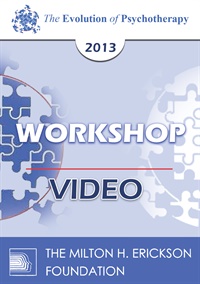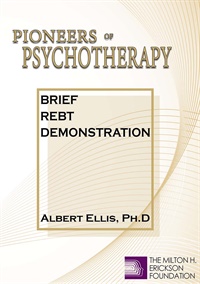
- Average Rating:
- Not yet rated
- Topic Areas:
- Clinical Demonstrations | Rational Emotive Behavior Therapy (REBT) | Anger | Humor | Psychotherapy
- Bundle(s):
- Pioneers of Psychotherapy Bundle
- Categories:
- Pioneers of Psychotherapy | Evolution of Psychotherapy | Evolution of Psychotherapy 2000
- Faculty:
- Albert Ellis, PhD
- Course Levels:
- Master Degree or Higher in Health-Related Field
- Duration:
- 00:51:00
- Format:
- Audio and Video
- Original Program Date:
- May 27, 2000
- Short Description:
- Albert Ellis (2000) demonstrates with two volunteers. The first volunteer is angry and intimidated by her supervisors. Humor and imagery are incorporated. The second volunteer feels a need to control others and is angry when she can’t. Ellis uses imagery to correct cognitive patterns and produce an emotional shift.
- Price:
- $59.00 - Base Price
Tags: REBT Humor Anger Psychotherapy Albert Ellis
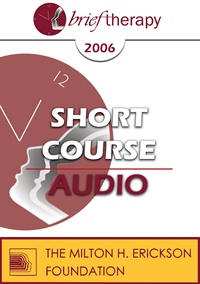
- Average Rating:
- Not yet rated
- Topic Areas:
- Short Courses | Anger | Anxiety | Brief Therapy | Communication
- Categories:
- Brief Therapy Conference | Brief Therapy Conference 2006
- Faculty:
- Kevin Humphrey, MA | Allan Sargent | Marilyn Sargent
- Duration:
- 1:15:09
- Format:
- Audio Only
- Original Program Date:
- Dec 07, 2006
- Short Description:
- Does your client have anyone in their life that can "get them," so that they feel like running away or punching the person out? What if you had the hemispheric integration tool that can change their initial response to that person or even to a situation? When clients remain centered, they will influence and set boundaries that will actually change the dynamics of the relationship. When your client is different the interactions have to evolve.
- Price:
- $15.00 - Base Price
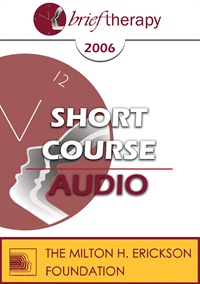
- Average Rating:
- Not yet rated
- Topic Areas:
- Short Courses | Anger | Brief Therapy | Couples Therapy | Relationships
- Categories:
- Brief Therapy Conference | Brief Therapy Conference 2006
- Faculty:
- Barton Goldsmith, PhD
- Duration:
- 1:10:40
- Format:
- Audio Only
- Original Program Date:
- Dec 07, 2006
- Short Description:
- This is a workshop that teaches the participants how to improve their work with couples, and how to use the client/practitioner relationship so that everyone grows. This experience is for therapists who wish to add proven techniques to their already successful ability to work with couples. Emotional fitness teaches the therapist how to see what it is their clients really want in a relationship and provides techniques for helping them achieve their goals.
- Price:
- $15.00 - Base Price
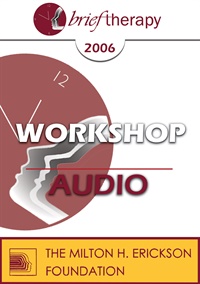
- Average Rating:
- Not yet rated
- Topic Areas:
- Workshops | Anger | Children and Adolescent Therapy | Brief Therapy
- Categories:
- Brief Therapy Conference | Brief Therapy Conference 2006
- Faculty:
- Kenneth Hardy, PhD
- Duration:
- 2:27:17
- Format:
- Audio Only
- Original Program Date:
- Dec 10, 2006
- Short Description:
- This workshop will focus on providing treatment strategies clinicians and other human services providers can use in their work with youth who are troubled by circumstances that complicate the negotiation of the "normal developmental struggles" of adolescence. A framework for understanding adolescents who are prone toward angry, aggressive and explosive behaviors will be presented. Specific strategies for enhancing effective assessment, engagement and treatment with troubled adolescents will be provided.
- Price:
- $15.00 - Base Price
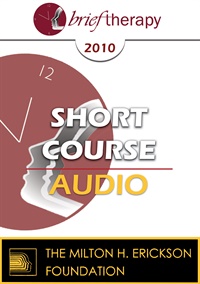
- Average Rating:
- Not yet rated
- Topic Areas:
- Short Courses | Brief Therapy | Anger
- Categories:
- Brief Therapy Conference | Brief Therapy Conference 2010
- Faculty:
- Linda Duncan, EdD
- Duration:
- 1:15:44
- Format:
- Audio Only
- Original Program Date:
- Dec 09, 2010
- Short Description:
- This workshop presents a theory of emotion and model for therapy, founded on the positive view that emotions offer us opportunities to realign with our inherent wholeness, once disruptions occur. The key lies in resolving the destabilizing effects of emotion with a stabilizing emotional and psychological strength. With fear, the strength is personal power, for example. The workshop includes principles and interventions. A map of emotion illustrates the arc of its occurrence from stimulus and effect to regulation and resolution.
- Price:
- $15.00 - Base Price
Tags: Anger Brief Therapy
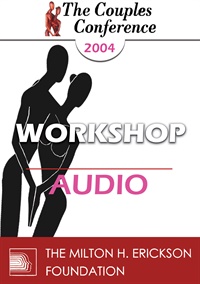
- Average Rating:
- Not yet rated
- Topic Areas:
- Workshops | Couples Therapy | Anger | Therapist Development
- Categories:
- Couples Conference | Couples Conference 2004
- Faculty:
- Peter Pearson, PhD
- Duration:
- 2:02:37
- Format:
- Audio Only
- Original Program Date:
- Mar 28, 2004
- Short Description:
- Chronically angry, hostile, distancing and rigid couples are a clinical and personal challenge. In this workshop, you will learn to change the trajectory of therapy as soon as entrenched patterns are noticed, to stay out of their conflict, and stay calm in the middle of their storm.
- Price:
- $15.00 - Base Price
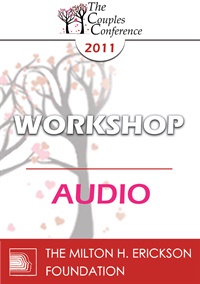
- Average Rating:
- Not yet rated
- Topic Areas:
- Workshops | Anger | Couples Therapy
- Categories:
- Couples Conference | Couples Conference 2011 | Pioneers in Couples and Family Therapy
- Faculty:
- Ellyn Bader, PhD
- Duration:
- 1:09:17
- Format:
- Audio Only
- Original Program Date:
- Apr 02, 2011
- Short Description:
- Explore couples therapy techniques for addressing hostile, angry partners. Learn specialized strategies for managing conflict, processing emotional trauma, and helping couples develop effective communication skills. Includes practical interventions like the Twilight Zone exercise and rapid repair technique, with insights into relationship dynamics and therapeutic approaches.
- Price:
- $15.00 - Base Price
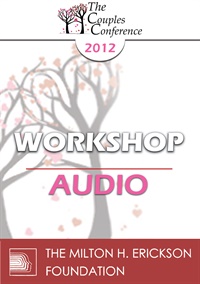
- Average Rating:
- Not yet rated
- Topic Areas:
- Workshops | Anger | Couples Therapy | Neurobiology
- Categories:
- Couples Conference | Couples Conference 2012
- Faculty:
- Rick Hanson, PhD
- Duration:
- 1:55:29
- Format:
- Audio Only
- Original Program Date:
- Apr 29, 2012
- Short Description:
- The first emotion our ancestors evolved was fear—and we remain highly threat reactive today, continually overestimating threats and underestimating opportunities and resources. We’ll explore multiple methods for helping clients “cool the fires” of fear and anger, and internalize inner strength and an appropriate sense of safety.
- Price:
- $15.00 - Base Price
Tags: Anger Couples Therapy Neurobiology
- Average Rating:
- Not yet rated
- Topic Areas:
- Workshops | Anger | Cognitive Behavior Therapy (CBT) | Psychotherapy
- Categories:
- Evolution of Psychotherapy | Evolution of Psychotherapy 2005
- Faculty:
- Donald Meichenbaum, PhD
- Course Levels:
- Master Degree or Higher in Health-Related Field
- Duration:
- 1:22:09
- Format:
- Audio and Video
- Original Program Date:
- Dec 07, 2005
- Short Description:
- A life-span, cognitive-behavioral approach will be offered to treat individuals who have problems controlling their anger and who have related co-morbid psychiatric problems. The issues of prediction of violence and how to intervene across the entire life-span will be highlighted. Specific cognitive-behavioral interventions will be demonstrated.
- Price:
-
Sale is $29.00
price reduced from Base Price - $59.00
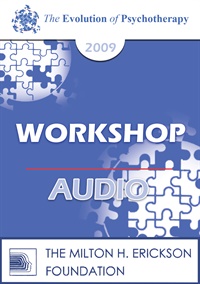
- Average Rating:
- Not yet rated
- Topic Areas:
- Workshops | Anger | Cognitive Behavior Therapy (CBT) | Psychotherapy | Treatment Planning
- Categories:
- Evolution of Psychotherapy | Evolution of Psychotherapy 2009
- Faculty:
- Donald Meichenbaum, PhD
- Duration:
- 2 Hours 44 Minutes
- Format:
- Audio Only
- Original Program Date:
- Dec 10, 2009
- Short Description:
- Dr. Meichenbaum will trace how aggressive behavior develops, and consider both the treatment and preventive implications.He will use video training films to demonstrate how to conduct cognitive-behavioral Stress Inoculation Training with angry and aggressive individuals. He will consider how to incorporate generalization guidelines into any training program.
- Price:
- $15.00 - Base Price
- Average Rating:
- Not yet rated
- Topic Areas:
- Workshops | Anger | Children and Adolescent Therapy | Psychotherapy
- Categories:
- Evolution of Psychotherapy 2013 | Evolution of Psychotherapy
- Faculty:
- Donald Meichenbaum, PhD
- Course Levels:
- Master Degree or Higher in Health-Related Field
- Duration:
- 1:13:44
- Format:
- Audio and Video
- Original Program Date:
- Dec 12, 2013
- Short Description:
- How do you “make” a violent individual, and what are the implications for both prevention and treatment, using a life-span perspective? This workshop will demonstrate how to use evidence-based interventions with angry and aggressive children, adolescents and adults. A major focus will be on ways to bolster generalization and maintenance of treatment effects.
- Price:
-
Sale is $29.00
price reduced from Base Price - $29.00
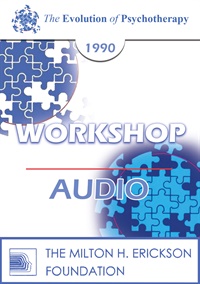
- Average Rating:
- Not yet rated
- Topic Areas:
- Workshops | Anger | Anxiety | Cognitive Behavior Therapy (CBT) | Depression | Psychotherapy
- Categories:
- Evolution of Psychotherapy | Evolution of Psychotherapy 1990
- Faculty:
- Donald Meichenbaum, PhD
- Duration:
- 2 Hours 2 Minutes
- Format:
- Audio Only
- Original Program Date:
- Dec 15, 1990
- Short Description:
- The focus will be on the cognitive-behavioral treatment of affective disorders (anxiety, depression, and anger). Such procedures as cognitive restructuring, problem-solving, and stress inoculation training will be examined.
- Price:
- $15.00 - Base Price
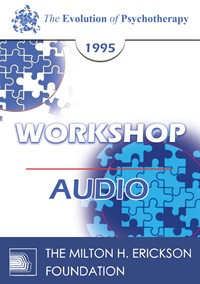
- Average Rating:
- Not yet rated
- Topic Areas:
- Workshops | Anger | Anxiety | Cognitive Behavior Therapy (CBT) | Depression | Psychotherapy
- Categories:
- Evolution of Psychotherapy | Evolution of Psychotherapy 1995
- Faculty:
- Donald Meichenbaum, PhD
- Duration:
- 36 Minutes
- Format:
- Audio Only
- Original Program Date:
- Dec 17, 1995
- Short Description:
- The focus will be on the cognitive-behavioral treatment of adults with affective disorders (anxiety, depression, anger). Such treatment procedures as cognitive restructuring, problem-solving and stress inoculation training will be demonstrated.
- Price:
- $15.00 - Base Price
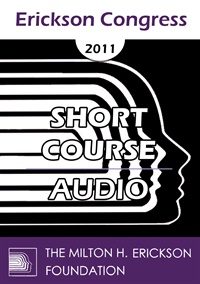
- Average Rating:
- Not yet rated
- Topic Areas:
- Short Courses | Anger | Destabilization
- Categories:
- Erickson Congress | Erickson Congress 2011
- Faculty:
- Linda Duncan, EdD
- Duration:
- 1:27:24
- Format:
- Audio Only
- Original Program Date:
- Dec 09, 2011
- Short Description:
- This workshop presents a theory of emotion and model for therapy, founded on the positive view that emotions offer us opportunities to realign with our inherent wholeness, once disruptions occur. The key lies in resolving the destabilizing effects of emotion with a stabilizing emotional and psychological strength. With fear, the strength is personal power, for example. The workshop includes principles and interventions. A map of emotion illustrates the arc of its occurrence from stimulus and effect to regulation and resolution.
- Price:
- $15.00 - Base Price
Tags: Anger Destabilization

- Average Rating:
- Not yet rated
- Topic Areas:
- Hypnosis | Workshops | Anger | Art and Creativity | Ericksonian Hypnosis and Therapy Techniques | Music
- Categories:
- Erickson Congress | Erickson Congress 2011
- Faculty:
- Albina Tamalonis, PsyD
- Duration:
- 59 Minutes
- Format:
- Audio Only
- Original Program Date:
- Dec 07, 2011
- Short Description:
- Ericksonian hypnotic techniques, potentiated by music, can help the angry patient learn a nonreactive relationship to their anger. The science of music physiology and research that supports the efficacy of recording your hypnosis will be presented. The legal and “fair use” of music on CD’s will be explained. Listening to hypnosis with music will allow attendees to experience this calming effect for themselves.
- Price:
- $20.00 - Base Price



